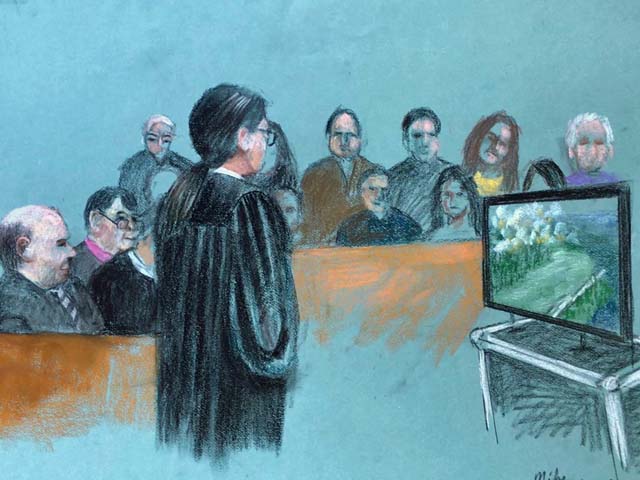
Sherbrooke Quebec - A Quebec judge told the jurors at the Lake Megantic trial Monday to take all the time they need to reach a verdict for three former railway employees accused in the tragedy that killed 47 people.
Earlier in the day, the jury, which began deliberating last Thursday, sent Quebec Superior Court Justice Gaetan Dumas an envelope, sparking excitement at the courthouse in Sherbrooke about a possible verdict.
It was not to be, however, as jurors instead asked Dumas for a dictionary and for clarification on various judicial matters such as the concept of "reasonable doubt".
It was the first time jurors had emerged since being sequestered.
They must decide the fate of Tom Harding, Richard Labrie, and Jean Demaitre.
Dumas rejected the request for a dictionary, telling the eight men and four women the only evidence they could use had to have been presented in the courtroom.
"No dictionary was filed in evidence," he told jurors.
"Use the common sense of the words. Use your daily vocabulary. If there is a term on which you are having particular difficulty, don't hesitate to come back."
Dumas gave the jurors more details about the concept of "reasonable doubt".
He also explained to them how the accused's actions must be judged by comparing that conduct to what they thought a reasonable person would do in the same circumstances.
"We have told you many times to be patient," Dumas said.
"You have waited patiently through three months of evidence. We know your task isn't simple. Take all the time necessary to complete your task. I don't want you to feel any pressure."
Charles Shearson, one of Harding's lawyers, said the jurors' questions indicate they are taking their job seriously.
"These are concepts that are hard to map out for an individual who is not in the judicial system on a daily basis," he told reporters outside the courtroom.
"It's hard to speculate but it tells us they are taking their task seriously and they are seeking to clearly understand the principles that underlie both the criminal justice system as a whole, and that underlie criminal negligence."
Harding was the train's engineer, Labrie the rail traffic controller, and Demaitre the manager of train operations at the time of the tragedy.
The Crown contends Harding failed to perform a proper brake test and didn't apply enough handbrakes after he parked the convoy late on the night of 5 Jul 2013.
Labrie and Demaitre are accused of failing to ask enough questions to ensure the train was properly secure after a fire broke out on the locomotive and firefighters shut off its engine, compromising the braking system.
All three accused can be found guilty of criminal negligence causing the death of 47 people, while jurors have the option of convicting Harding on one of two other charges, dangerous operation of railway equipment, or dangerous operation of railway equipment causing death.
The maximum sentence for a conviction on criminal negligence is life imprisonment, for dangerous operation of railway equipment causing death it is 14 years, and for dangerous operation of railway equipment it is five years.
Author unknown.
under the provisions in
Section 29 of the Canadian
Copyright Modernization Act.



